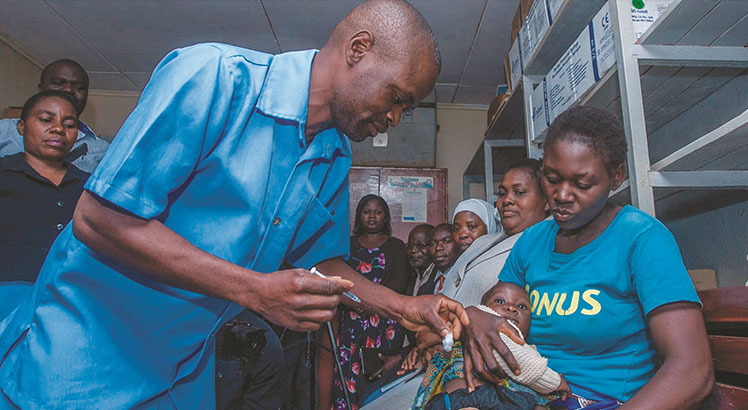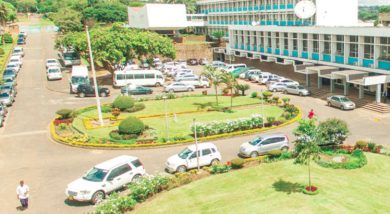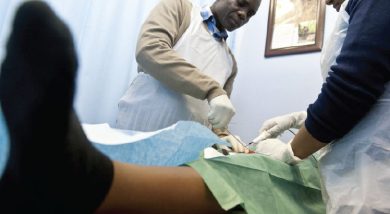Malaria vaccine; a beacon of hope for Malawi
In the heart of Chikwawa, a success story unfolds as Baby Cecilia, daughter of Group Village Head Chikutileni 1 emerges as a symbol of triumph over malaria.
Enrolled in the malaria vaccine trial in 2019, Cecilia has never suffered from the disease, offering a glimmer of hope in a district where malaria reigns as the leading cause of infant mortality.

Chikutileni recalls the apprehension he felt upon Cecilia’s birth in December 2018, knowing the looming threat of malaria in his community.
“So when I heard that the Malawi Liverpool Wellcome Trust was in my area to register children for the malaria vaccine trial, I did not think twice, but register my daughter, ensuring she received all four required doses of the malaria vaccine,” he recalls.
Cecilia, now five, got the first dose of the vaccine at five months and the other three jabs at six, seven and 22 months.
“As a leader, I stood up to set a good precedent. You know when vaccines are just introduced; there are a lot of misconceptions. But now they look at my daughter and get inspired” he says.
The Malaria vaccine is being provided as part of the under-five routine immunisation programme in 11 highly Malaria burdened districts of Karonga, Nkhata-Bay, Mchinji, Lilongwe, Ntchisi, Balaka, Mangochi, Machinga, Chikwawa, Phalombe and Nsanje.
Bureau Health Centre Senior Disease Surveillance Assistant Lucy Chatuwa commends community leaders support, including Chikutileni, especially during outreach programmes.
She hints that collaborative efforts between health authorities and local leaders have significantly bolstered immunisation efforts in the area.
In Machinga, Nyambi Health Centre senior disease surveillance assistant Square Kambona says through community engagement and education, the facility has seen a notable increase in immunisation uptake, leading to a decline in malaria cases among children.
Over 4 600 children around the facility’s catchment area have received the malaria vaccine since 2019.
“We have registered a tremendous drop in malaria cases among children since we started administering the malaria vaccine. In the past, of the 100 children presented to the facility, 60 percent were diagnosed with malaria, but now we are at 40 percent,” he explains.
The health centre, serving 54 711 people, including 9 000 under five children, registers about 500 malaria cases monthly.
Malaria is the most registered disease at the facility seconded by pneumonia.
However, despite these success stories, challenges persist in extending the reach of the malaria vaccine to all districts.
Nsiyaludzu Health Centre senior disease control and surveillance assistant for Ntcheu Shadreck Mapulanga underscores the urgent need for expansion in all districts.
He explains: “Our facility has a catchment area of 40 562 and primarily treats malaria with up to 4 000 cases a month.
“We experience similar challenges as our neighbouring Balaka District. I wish we were given a special consideration, too.”
Ministry of Health spokesperson Adrian Chikumbe acknowledges the demand for the vaccine, but assures that ongoing negotiations with global health organisations will broaden its availability.
Malaria remains a formidable health burden in Malawi, killing five people a day.
It contributes 25 percent of all outpatient department attendance, 10 percent of all admissions and 12 percent of deaths recorded in the country.
In 2023, Malawi recorded 6.4 million malaria cases with a total of 1 670 deaths an increase from 4.2 million in 2022 but deaths decreased from 1 829 in 2022 to 1 670 in 2023.
Minister of Health Khumbize Chiponda attributed the increase in the cases to various climatic shocks, including Cyclone Freddy which the country experienced last year.
She emphasizes the urgency of comprehensive strategies, including vaccination and early preventive treatment for expectant mothers, to combat the disease.
“This is why we are still lobbying the World Health Organisation (WHO) to roll out the malaria vaccine in all the country’s districts. I am also encouraging all parents in the 11 districts where we are administering this vaccine to ensure their children take all four doses starting from five months old,” says Chiponda.
She was upbeat that with support from partners such as WHO, Unicef and World Vision, Malawi will eradicate malaria by 2030.
Unicef Malawi chief of social policy Mathew Tasker hints that efforts continue to increase the uptake of preventative treatments, especially among vulnerable populations such as pregnant women and children including malaria immunisation.
The vaccine, the first of its kind against a parasitic disease, has already reached over 1.7 million children in pilot programs across Malawi, Ghana and Kenya since 2019 according to WHO.
It has documented a significant reduction in severe malaria cases and a decrease in mortality among vaccinated children, illustrating the vaccine’s effectiveness and life-saving potential.
Further, WHO national professional officer for malaria and neglected tropical diseases (NTDs) Michael Kayange underscores that through various interventions, the organisation has managed to avert 2.1 billion malaria cases and prevented 11.7 million deaths due to malaria globally, between 2000 and 2022.
He further states that the world has invested over $50 billion in the fight against malaria in the same period.
“WHO will continue to provide all the necessary support to Malawi including malaria vaccines to achieve its 2030 goals,” he adds.
The WHO coordinated the Malaria vaccine pilot programme in a collaborative effort with ministries of health and a range of partners, including global health organisations such as PATH and GSK, the vaccine developer and manufacturer, which donated up to 10 million vaccine doses for the pilot.






qLmeZSUo